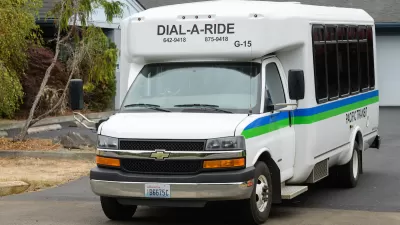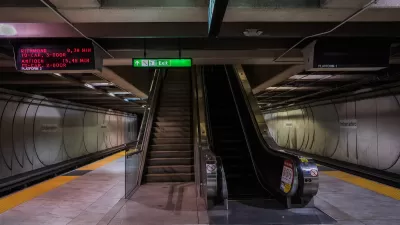Ridership data shows that many D.C. transit users depend on the service, despite a drop in ridership. The system needs changes—and funding—to have a future.

In an opinion piece published in Greater Greater Washington, DW Rowlands asserts that transit in the Washington, D.C. region has a “bright future,” if properly planned for.
The district certainly has transit challenges: the area still has one of the nation’s highest rates of remote work, and D.C. transit has historically relied on a heavy percentage of commuters. However, the distribution of ridership has also evened out over days and times, which, according to Rowlands, “actually has potential benefits for the system, because the extra service that transit agencies run to serve peak ridership is extremely inefficient compared to basic all-day service.”
Rowland adds, “Ridership changes since the start of the pandemic have also highlighted the importance of bus service. While Metrorail ridership first exceeded 50% of its pre-pandemic value in the first half of 2023, Metrobus ridership had returned to nearly 60% of its pre-pandemic value in the third quarter of 2021, and is now above 85% of pre-pandemic ridership.” Rowland attributes this in part to the fact that Metro bus routes serve more residential neighborhoods outside of downtown.
For Rowland, all this is to say that D.C. transit is still a key service for many of the region’s residents. “In the short term, finding the money to close the funding gap and prevent massive service cuts in next July is the most important part of making sure that Metro, and transit in our region generally, has a future.” Rowland also suggests long-term changes, such as fare reform, adapting schedules to match new travel patterns, and adding more bus lanes to improve reliability.
FULL STORY: Transit in the Washington region has a future, if we plan for it

Planetizen Federal Action Tracker
A weekly monitor of how Trump’s orders and actions are impacting planners and planning in America.

Congressman Proposes Bill to Rename DC Metro “Trump Train”
The Make Autorail Great Again Act would withhold federal funding to the system until the Washington Metropolitan Area Transit Authority (WMATA), rebrands as the Washington Metropolitan Authority for Greater Access (WMAGA).

The Simple Legislative Tool Transforming Vacant Downtowns
In California, Michigan and Georgia, an easy win is bringing dollars — and delight — back to city centers.

The States Losing Rural Delivery Rooms at an Alarming Pace
In some states, as few as 9% of rural hospitals still deliver babies. As a result, rising pre-term births, no adequate pre-term care and "harrowing" close calls are a growing reality.

The Small South Asian Republic Going all in on EVs
Thanks to one simple policy change less than five years ago, 65% of new cars in this Himalayan country are now electric.

DC Backpedals on Bike Lane Protection, Swaps Barriers for Paint
Citing aesthetic concerns, the city is removing the concrete barriers and flexposts that once separated Arizona Avenue cyclists from motor vehicles.
Urban Design for Planners 1: Software Tools
This six-course series explores essential urban design concepts using open source software and equips planners with the tools they need to participate fully in the urban design process.
Planning for Universal Design
Learn the tools for implementing Universal Design in planning regulations.
Smith Gee Studio
City of Charlotte
City of Camden Redevelopment Agency
City of Astoria
Transportation Research & Education Center (TREC) at Portland State University
US High Speed Rail Association
City of Camden Redevelopment Agency
Municipality of Princeton (NJ)





























